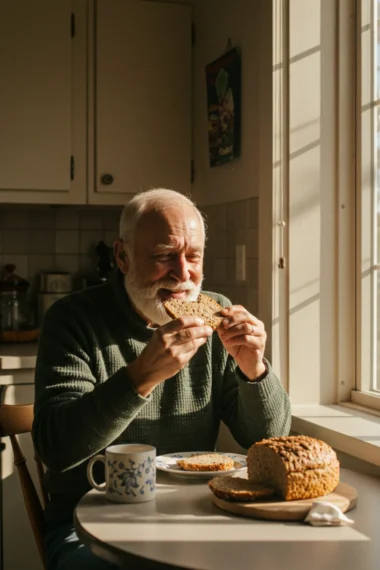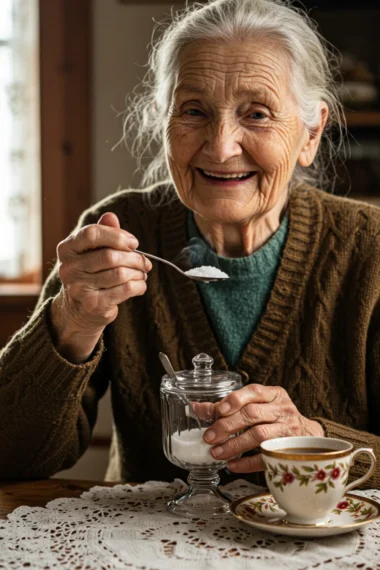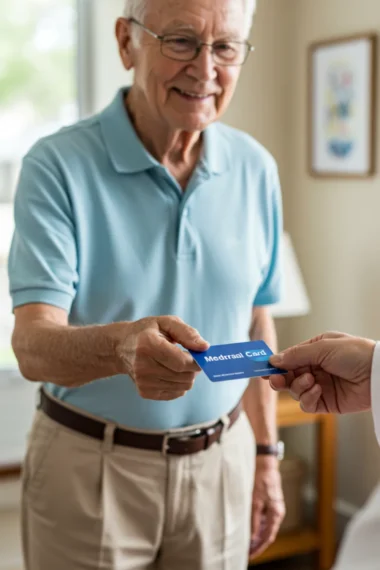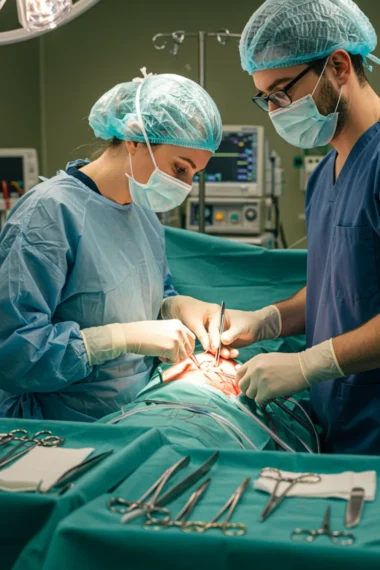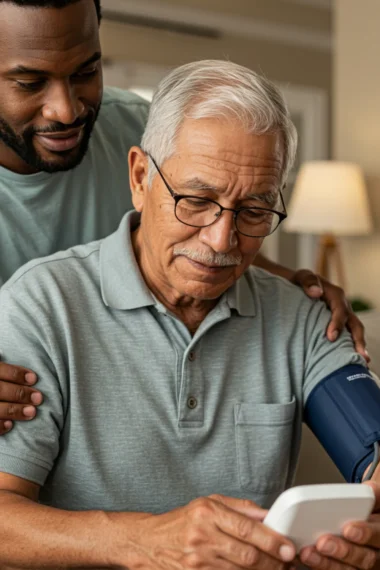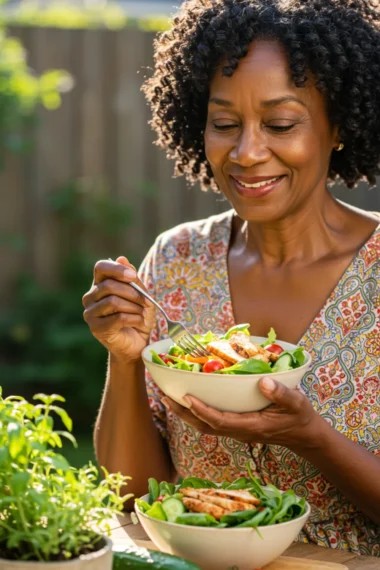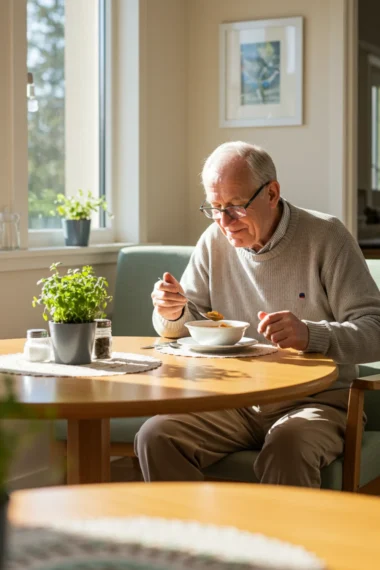What Time Do Senior Citizens Eat Dinner? Elderly Mealtime Routines
Dinner isn’t just a meal for seniors—it’s a part of a carefully balanced routine. Most elderly adults eat dinner between 4:30 PM and 6:00 PM, but why so early? From medication schedules to digestion issues and circadian rhythms, many factors influence these habits.
According to the U.S. Department of Health and Human Services (HHS), there are more than 54.1 million seniors aged 65 and older living in the United States as of 2024.
As people age, dinner time often shifts earlier—sometimes by several hours compared to younger adults. While someone in their 30s may have dinner around 7:30 or even 9:00 PM, many senior citizens finish their evening meal by 5:00 PM. This isn’t just a cultural quirk—it’s deeply rooted in physiology, medication routines, lifestyle patterns, and even mental health.
Common Dinner Times for Senior Citizens
Most senior citizens eat dinner between 4:30 PM and 6:00 PM.
But that’s not just anecdotal. Based on a National Poll on Healthy Aging conducted by the University of Michigan in 2021, adults over 65 were 58% more likely to have dinner before 6:00 PM than those under 50.
Here’s a snapshot of typical dinner times by age group:
| Age Group | Average Dinner Time |
|---|---|
| 20–39 | 6:45 PM – 8:30 PM |
| 40–59 | 6:30 PM – 7:45 PM |
| 60+ | 4:30 PM – 6:00 PM |
Why So Early?
Senior citizens tend to follow earlier routines due to:
- Earlier bedtimes
- Better digestion
- Medication timing
- Energy management
- Social or assisted-living routines
Why Do Seniors Eat Dinner Early? 7 Main Reasons
These are the main reasons older adults prefer early dinners.
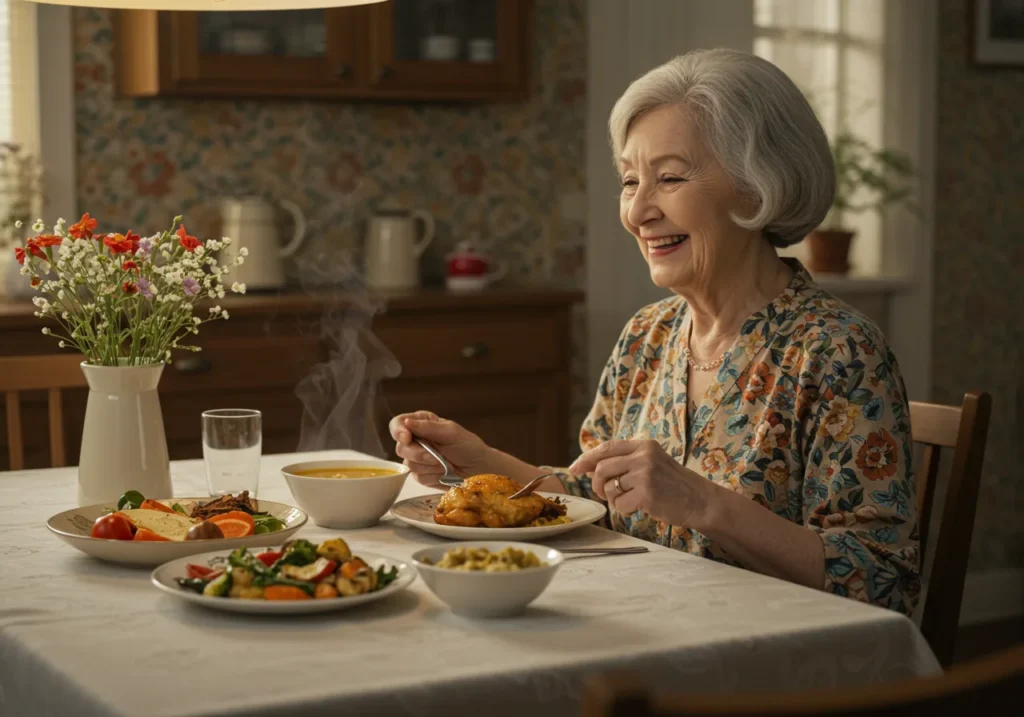
1. Circadian Rhythm Shifts With Age
As people age, their biological clocks change.
Older adults experience “advanced sleep phase syndrome” (ASPS)—they get sleepy earlier and wake up earlier. This means they naturally want to eat earlier too.
“As the internal clock shifts with age, older adults tend to feel hungry earlier in the day and satisfied with earlier meals,” says Dr. Martha Smith, Geriatrician at Mayo Clinic.
So, when the body starts preparing for sleep at 7:00 PM, it wants dinner by 5:00 PM—sometimes even earlier.
2. Medication Timing & Requirements
About 89% of people aged 65+ take at least one prescription medication daily. Many of these medicines must be taken with food or on a consistent schedule.
Some examples include:
- Blood pressure meds: often taken in the morning and evening, requiring a consistent dinner time.
- Diabetes meds or insulin: must be timed with food to avoid sugar crashes.
- Cholesterol medications (statins): usually taken at night, which may require an earlier meal.
Skipping or delaying meals can interfere with how well medications work—or lead to dangerous side effects.
3. Slower Digestion & Gastrointestinal Health
Older adults experience slower digestion, lower stomach acid production, and more sensitivity to fatty or spicy foods. Eating late can cause:
- Heartburn
- Acid reflux
- Indigestion
- Bloating
Eating earlier gives the body more time to digest before bedtime, leading to:
- Better sleep
- Less discomfort
- Fewer bathroom trips at night
4. Energy Peaks Early in the Day
Most seniors experience an energy drop-off in the evening. By 5 PM, they’re often winding down, not gearing up for a heavy meal.
Large or late meals can feel exhausting, especially if:
- They’ve been active during the day
- They live with chronic fatigue, arthritis, or mobility issues
- They have poor appetite in the evening
A light, early dinner followed by a healthy bedtime snack is common.
5. Dementia and Alzheimer’s Considerations
Seniors with dementia or Alzheimer’s often struggle with “sundowning syndrome”, where symptoms worsen in the evening. Eating dinner earlier helps caregivers manage:
- Confusion
- Irritability
- Disorientation
- Wandering or agitation
Early meals reduce stimulation later in the day and improve rest patterns.
6. Structured Routines in Retirement Communities
In assisted living or nursing homes, meal times are usually set. Dinner is typically served:
- Between 4:00 PM and 5:30 PM
- With limited flexibility
This helps staff coordinate care, manage medications, and maintain structure for residents who thrive on routine.
7. Social Factors & Family Habits
Seniors who live alone may eat earlier simply because:
- They don’t want to cook late
- They follow long-standing family habits
- They align meals with daytime activities like doctor visits or community events
Some seniors adapt their dinner time to spend more time with family, especially if kids or grandkids visit earlier.
What Do Senior Citizens Typically Eat for Dinner?
Now that we know when they eat, let’s talk about what they eat.
Typical senior dinners include:
| Food Category | Common Examples |
|---|---|
| Lean Proteins | Grilled chicken, turkey, beans, eggs |
| Veggies | Steamed broccoli, carrots, squash |
| Whole Grains | Brown rice, quinoa, whole wheat pasta |
| Healthy Fats | Olive oil, avocado, nuts |
| Soft Textures | Mashed potatoes, stews, soups |
| Low-Spice | Avoiding hot peppers, garlic-heavy dishes |
- Lower salt
- Lower sugar
- Easier to chew or digest
- Nutrient-dense and high in fiber
More Opportunities: What Is the Best Lunch for Seniors?
Does Dinner Time Vary by Country?
Yes, drastically. While seniors in the U.S. and Canada often eat dinner by 5:00 PM, it’s very different elsewhere.
| Country | Senior Dinner Time |
|---|---|
| United States | 4:30–6:00 PM |
| Canada | 5:00–6:00 PM |
| United Kingdom | 5:30–6:30 PM |
| Germany | 6:00–7:00 PM |
| Spain | 8:30–10:00 PM |
| Italy | 7:00–9:00 PM |
| Japan | 6:00–7:00 PM |
| India | 8:00–9:00 PM |
In Mediterranean countries like Spain and Italy, even seniors eat much later due to cultural norms and warmer climates.
Tips for Managing Senior Dinner Routines
If you’re caring for an older adult, or are one yourself, here’s how to create a healthy dinner routine:
1. Stick to a Consistent Schedule
Try to eat dinner at the same time every day, ideally between 4:30 PM and 6:00 PM. This helps with:
- Medication absorption
- Sleep regulation
- Digestion
2. Focus on Light, Nutrient-Rich Meals
Heavy meals late in the day may disrupt sleep. Opt for:
- Lean proteins
- Veggies
- Whole grains
- Easy-to-digest options
3. Watch Portion Sizes
Seniors often need fewer calories, but more nutrients per bite.
4. Minimize Salt and Sugar
Too much sodium can worsen high blood pressure, while sugar spikes can impact diabetics.
5. Include Social Interaction
If possible, make dinner a social event. Loneliness is a huge issue among seniors—meals can be a joyful time to connect.
Final Thought
Senior citizens typically eat dinner between 4:30 PM and 6:00 PM for good reason. From managing medications to getting a better night’s sleep, earlier dinners help support health, energy, and quality of life. Whether you’re helping a parent, planning meals for a retirement community, or just curious—knowing why seniors eat early can help create healthier habits for everyone involved.
FAQs
Why do older adults eat dinner so early?
Because of changes in sleep patterns, medication schedules, and slower digestion, most seniors eat earlier—typically between 4:30 PM and 6:00 PM.
Is eating early better for digestion?
Yes. Earlier dinners allow the body more time to digest before sleep, reducing acid reflux and improving rest.
Is this the same for seniors in other countries?
No. In countries like Spain or India, dinner times can be as late as 9:00 or 10:00 PM, even for older adults.
Should caregivers force seniors to eat later?
No. It’s better to support their natural rhythm and ensure meals align with their medical and sleep schedules.
What should seniors avoid eating late in the day?
Fatty foods, caffeine, alcohol, and spicy dishes can cause discomfort and disrupt sleep.


